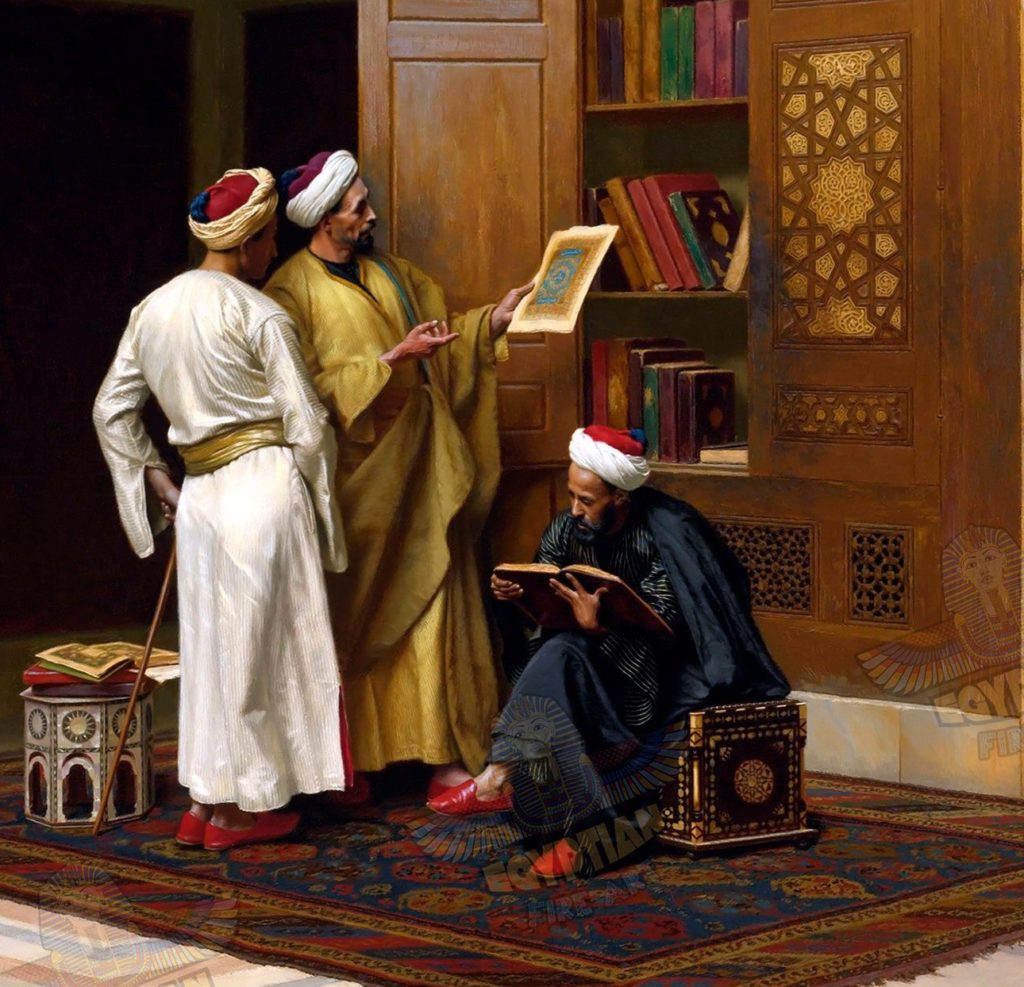
We should first list some definitions of a fatwā. Linguistically it is formed from the verbal noun iftā’, its plural is fatāwāand one says aftaytuhu fatwā, when one answers a question. The fatwā is a clarification on a difficulty or complex ruling. Technically, al-Qarāfī notes, “the fatwā is a report on the ruling of Allah concerning that which is obligatory or permissible”. For al-Jurjānī it is “a statement of the ruling on an issue” and for Ibn al-Ṣalāḥ “a signature from Allah, may He be blessed and exalted”. On the basis of these and other descriptions the fatwā can be defined as ‘a statement on a Sharī‘a ruling for those who demand such, but is not enforceable.
BY YUSUF YUSUF
THE WORD FATWĀ is mentioned in a number of Qur’ānic verses including: Then ask them whether they are stronger in creation or those others whom We have created. Surely We created them of firm clay[i] and They ask thee for a pronouncement. Say: Allah hath pronounced for you concerning he person who has neither parents nor offspring[ii] and They ask you a decision about women. Say: Allah makes known to you His decision concerning them[iii].
Muslims have resorted to seeking a fatwā ever since the first beginnings of Islam. Fatwās were issued by the Chief of all Messengers, the Imam of all Muftīs, and the One Entrusted with His Revelation, His very Ambassador between Him and His servants, who used to issue opinions on God on His most manifest Revelation and, as the Most Wise commanded him: Say: I do not ask you for any reward for it; nor am I of those who simulate[iv]. The Prophet’s fatwās were comprehensive, conclusive, once-and-for-all rulings, and in this role the scholars among the Companions and Followers succeeded him.[v]
How can such as these make rulings deputising for God or speaking like this in His name?
One of the most important books of fatwās for the Ahl al-Sunna wal-Jamā‘a[vi] according to the website Al-Maktaba al-Shāmila al-Ḥadītha are the following: the fatwās of Taqī al-Dīn Al-Subkī, the fatwās of the Qāḍī al-Jamā‘a Ibn Sirāj al-Andalusī, Al-Suyuṭī’s Al-Ḥāwī lil-Fatāwā, the, fatwās of Shihāb al-Dīn al-Ramlī, and the Fatāwā wa-Masā ‘il of Shaykh Muḥammad ibn ‘Abd al-Wahhāb, But conspicuous among all the above-mentioned fatwā collections is that of Shaykh al-Islam Ibn Taymiyya (661-728 AH). Al-Ḥāfiẓ al-Bazzār said concerning him:
As for his compositions and works, they are more than I can count or name. In fact it is beyond anyone to do so, since there are so many. they are very many, both lengthy and brief, and they are published widely over many a land. Name a country and you will find his works there.[vii]
On the basis of Ibn Taymiyya’s fatwās people have been slaughtered, burned, crucified and flayed alive by Islamic terrorist organizations such as Al-Qaeda, ISIS and Al-Nuṣra.
There are also many collections of fatwās by Shi‘ite imams, including the following authorities: Khomeini, al-Ḥakīm, al-Khoei, al-Ṣadr and al-Sīstānī. In his controversial work Guide for the Mujāhid Kāẓim al-Ḥaerī (born 1938 AD in Iraq and based in Tehran) issued some disastrous fatwās including ‘The permission to kill an enlisted Iraqi soldier’, ‘On poisoning the water and food of the Iraqi army’, ‘The permission to kill an Iraqi prisoner’, ‘The permission to kill a Ba’athist in his house in the presence of members of his family’, ‘The permission to kill Saddam’s Cubs’, ‘The permission to kill a policeman’ and ‘The permission to kill anyone co-operating with the regime’.[viii] All these fatwāstargeted Iraqis during the Iran-Iraq war. And have you seen how Iraqis have issued fatwās on killing their compatriots in order to appease Iran!
This fatwā was adopted by Islamic terrorist organizations to slaughter those who disagreed with them
The fatwā shaykhs had a major role in gaining the approval of the caliphs, by mosaicing together and pressing into service all these texts in order to obtain their favour. The following tale from the online site Quṣṣat al-Islām is the strongest evidence for that:
When Al-Rashīd assumed the caliphate one of his father al-Mahdī’s slave-girls captured his heart. He sought to win her over but she replied, “I cannot be with you since your father was intimate with me”. But he was passionate about her and sent to the judge Abū Yūsuf (a disciple of Abū Ḥanīfa) asking him: “Do you have anything to help me on this?” He replied: “O Prince of the Faithful, should whatever a slave girl claims be believed? Do not believe her for she is not to be trusted”. [ix]
Thus, the issuing of a fatwā was exploited to bend sexual matters to the benefit of the sovereign in certain eras, and still now. The Divinity is surely far too exalted and sacred for such matters, so how can such as these make rulings deputising for God or speaking like this in His name?
How to read all of this?
Firstly, I view the incident of the killing of the Jewish prisoners of the Banū Qurayẓa as a bloody example of the first fatwās that were issued in the early days of Islam. In the year 5 AH the Banū Qurayẓa had surrendered to the Prophet after a siege of 25 days, and the Companion Sa‘d ibn al-Mu‘ādh was appointed to pass the judgment over them. He ordered their menfolk to be killed and their women and children to be made captives. This was accordingly carried out: 700 of them were killed and the details of this incident were confirmed in the sources – you can refer to these for more details. It should be said that Sa‘d ibn al-Mu‘ādh could not have sentenced them to death without the approval of the Messenger of Islam, who blessed this ruling on their murder by saying, “This is the judgment of Allah from the seven heavens above!” This fatwā formed the basis of many subsequent rulings by fatwā-issuing shaykhs and was adopted by Islamic terrorist organizations to slaughter those who disagreed with them and their ideas.
Secondly – I think that we can accept fatwās when issued on specific matters, such as issues of worship, prayer, methods of ablution and fasting, and issues of inheritance and zakāh, all of them confined to a limited scope. Other social problems in our present age, I believe, can be solved by civil laws.
These fatwās have turned clerics into some earthly front, issuing rulings for human beings in the name of the Lord of Mankind
A basic reading
If we leave this first reading aside, we are confronted with a major dilemma: we have to analyse things according to reason and logic.
a) In the early days of Islam, Muḥammad was the one who issued fatwās, in his role as a Prophet since, as the Qur’ān states:
Nor doth he speak of his own desire. It is naught but revelation that is revealed.[x]
and because he was ‘the One Entrusted with His Revelation, His very Ambassador between Him and His servants, who used to issue opinions on God on His most manifest Revelation’. This means that Muḥammad was the Messenger of Islam, issuing fatwās on earth on behalf of God and, more precisely, representing God on earth. Because Muḥammad’s people could not address God other than through him, he was the only one through whom contact with God could be made!
b) If we assume for the sake of argument that the male members of the family of Muḥammad – the children of Fāṭima and ‘Alī ibn Abī Ṭālib – who represent the descendants of the Prophet right up to the twelfth Imam Abū al-Qāsim Muḥammad ibn al-Ḥasan al-‘Askarī the Imam al-Mahdī, one may consider these eligible for issuing fatwās, in their capacity as scions of Muḥammad via his daughter Fāṭima. If we theoretically add some of the Companions, on the grounds that some were missionaries of Paradise, and some of the Followers too, these could be accepted (again for the sake of argument). But from another angle we have to say that these too are representatives of God on earth, that is, they share the same status as the Messenger of Islam. But we hit another hole here darker than the first: just how many representatives of God on earth are there? Muḥammad, the Āl al-Bayt, the Companions, the Followers …?
c) There is the disturbing matter of what is happening in Egypt with the Al-Azhar institution, which continues to issue fatwās and has founded the Al-Azhar Fatwa Global Centre[xi] and I would also add the fatwās that are being issued over the phone with the opening of ‘fatwā kiosks’ in metro stations and on roadsides. The upshot of this is that fatwās have become shops.
d) From all of the above, and given that there are hundreds of thousands of fatwā-shaykhs, if a fatwā is considered to be a divine legal ruling, this would imply that all shaykhs are now ‘representatives of the Lord of Mankind’. Logic would dictate that – in accordance with some sources – the only ones inheriting the Prophet’s function in issuing fatwās are ‘the Companions and the Followers’. For not everyone who wears a turban has become a shaykh and a muftī.

Suggested Reading
In sum, the clerics are appropriating the sanctity of God’s task to turn correct belief into law, by assuming the authority to permit or prohibit, to allow and enforce some acts as opposed to others under the pretext that they are issuing fatwās straight from the Qur’ān, the Sunna and the hadiths of Muḥammad. These fatwās have turned clerics into some earthly front, issuing rulings for human beings in the name of the Lord of Mankind. How many deputies, representatives and agents of the Lord of the Worlds are there to be? The situation has become tragic, for trading in the name of the Lord of the Worlds has now become official.
[i] Qur’ān XXXVII (al-Ṣāffāt), 11.
[ii] Qur’ān IV (al-Nisā’), 176.
[iii] Qur’ān IV (al-Nisā’), 127.
[iv] Qur’ān XXXVIII (Ṣād),86.
[v] This introductory text has been taken from the online site Ṭarīq al-Islām with a few adjustments and abridgements.
[vi] See Glossary on this term.
[vii] Text from the online site Ṣayd al-Fawā‘id.
[viii] Citation from Dr. Ḥamid ‘Abdallah on the تلك الأيام (‘Those Days’) programme.
[ix] Citation from Al-Salafī’s الطيوريات quoting as authority Ibn al-Mubārak.
[x] Qur’ān LIII (al-Najm), 3-4.
[xi] See the online website here.

